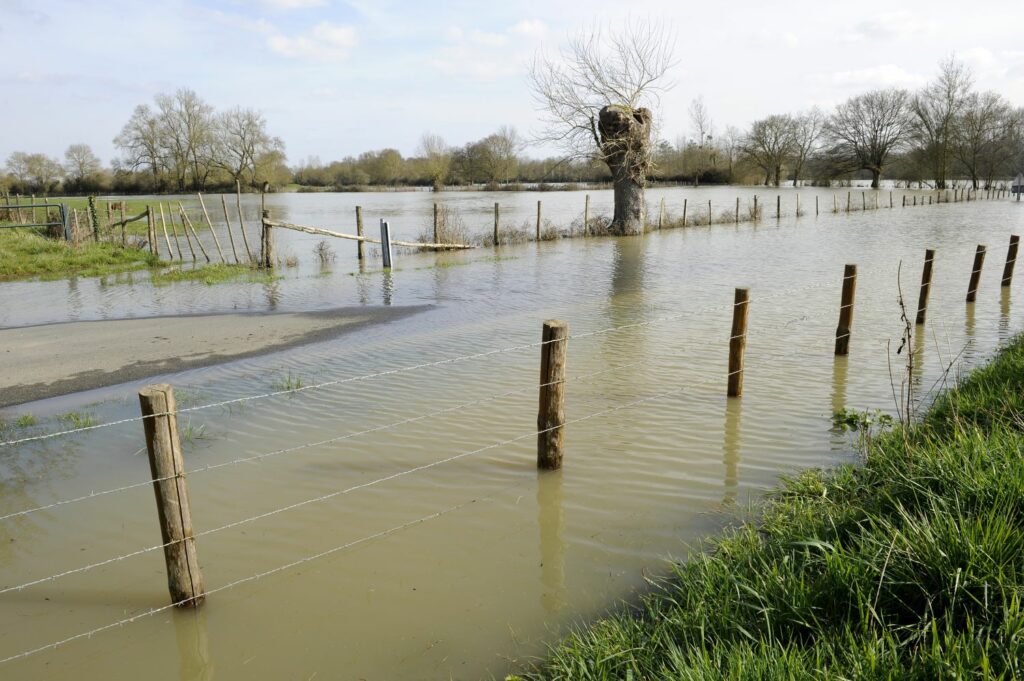Farm flooding advice issued for Wales, Midlands and South West
16th January 2023
NFU Mutual is reminding farmers to prioritise safety in the event of a flood and have a plan in place as high rainfall continues to endanger rural homes and livelihoods across the UK.
In response to destructive floods hitting Wales, the Midlands and the South West of England last week and further volatile weather to come, the rural insurer has issued advice regarding how to mitigate the impact of flooding on farms and rural properties.
The average farm flooding claim in 2022 was £26,343, climbing to £31,195 in November and December, the insurer revealed.
NFU Mutual rural affairs specialist Hannah Binns said the situation is being closely monitored with yellow weather warnings currently in place across various parts of the UK.
“The impact of flooding on farming can be significant as it not only disrupts vital work but can place lives in danger, so it is important rural businesses prepare appropriately for this risk,” Ms Binns stressed.
“There are a number of actions farmers can take to prepare for flooding, such as having a farm flood plan detailing everyone’s role should the worst happen.
“Farmers can also identify higher ground to move livestock to if water levels rise and move vulnerable machinery, tools, stocks and veterinary resupplies to safer areas.”
Safety must be the number one priority for those affected by flooding, Ms Binns continued, and steps must be taken to keep family and pets away from the flood water.
“Where possible, move to higher parts of the property and switch off electricity and gas supplies in flooded areas.
“At NFU Mutual our local Agents will be alert to flood warnings in their community and will be on hand to help, so it is important to have access to copies of any insurance documents and the relevant contact details,” Ms Binns advised.
NFU Mutual flood advice
To help farmers devise an effective action plan in case of an emergency, the rural insurer has provided detailed flooding advice as follows:
- Work out a farm flood plan so that if the worst does happen everybody knows what action to take and who is responsible for what.
- Identify higher ground that livestock can be moved to if water levels rise. If you’re renting land in a low-lying area, it’s worth speaking with neighbouring landowners to obtain permission to move livestock to their higher ground.
- Sign up for Environment Agency flood alerts at the Gov.uk website.
- Safely store fuels and chemicals that could pollute water courses in the event of flooding.
- Plan an evacuation route so that you, your family and employees stay safe. Keep contact details to hand of people who could help you move livestock in an emergency.
- Look at your farming practices and how these could impact on flooding and water penetration. Take steps to reduce soil compaction in fields and think about creating runoff ponds.
- Think about flood resilience measures for buildings which could be vulnerable to flooding. Think about locating electrical sockets and wiring higher up walls so that they’re not susceptible to flooding if water gets in.
- If you’re planning to invest in new buildings, speak to your insurer first to ensure that they can provide flood cover at that specific location.
- Identify machinery, tools or stock that could be moved to prevent loss or damage. Move vulnerable machinery stock and veterinary resupplies to safe locations if flooding is forecast.
- Consider how you’ll alert staff about a flood warning and how they can help you to prepare.
When the worst has already happened
When it comes to mitigating the consequences of flooding on farms, NFU Mutual advises:
- Make safety your priority. Keep your family and pets away from the flood water and move to another part of the property.
- Do not put your life or the lives of others at risk attempted to rescue stranded animals. Contact the emergency services or the RPSCA on 0300 1234999 for help.
- Use What3Words to communicate an accurate location quickly.
- Ensure you can be contacted in an emergency, such as keeping your phone charged up and stay in contact with those around you.
- Call your insurer immediately, asking about alternative accommodation if your property is unsafe.
- Check on family and friends and let them know your situation.
- If you can, switch off mains gas and electricity supplies in the affected area.
- Have a pack with essential items like prescriptions, other medicines and food, paying particular attention to items like baby food handy to take with you if needed.
- Have a torch and charged mobile phone on hand in case of power cuts.
- When it’s safe to enter the flooded area again, catalogue all damaged items for insurance claims and begin clearing and drying out the area, seeking advice from your insurance company.

